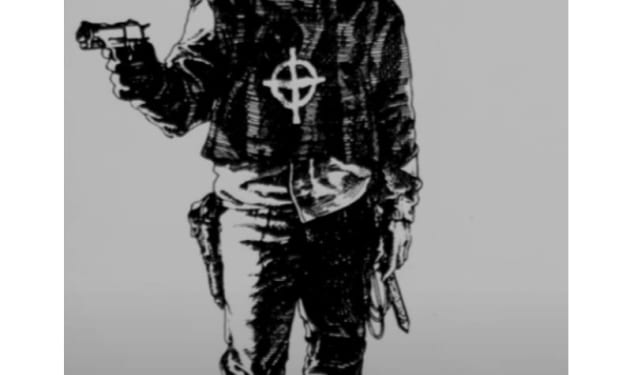
The court had mandated that the situation be resolved as quickly as possible, so I was quickly brought in to see the officer assigned my case. Whatever that meant. I wasn’t stupid. I’d heard stories about the way things worked in Section 7.
The Fabricator had requested that my parents come to the police station.
The room was painted pale green; it was smaller than I’d expected, and there was an acrid smell that told me other things had taken place there earlier in the day, things I didn’t want to know about. I didn’t ask. My mom stared at me. She was anxious. I didn’t say anything to her – we’d all been given instructions not to speak or move in any way that might be considered “provocative.” The last thing I wanted to be was provocative. According to my Fabricator, I’d already been too provocative for some people.
We – myself and my parents, Bob and Jennifer Fairchild – were escorted into a tiny cubbyhole, behind the larger main room where most of the intakes were being processed. I had received the special privilege of being registered by computer because my father was a well-known donor to the political parties and, as a courtesy, he’d asked that everything be expedited. He’d also asked that the charges be dropped but he wasn’t high enough on the chain to get me freed without a hearing. And hearings weren’t good things. Most people didn’t come back from hearings.
I’d almost finished my second year at college, when two plainclothesmen handed me a one page document, neatly folded and stamped with the official insignia of “the Congress of Laws.” I'd felt nauseous when I saw that red-and-blue stamp staring at me from the fold. Regular people didn’t get letters from the Congress of Laws. I’d been a regular person until a week before.
Before the protests.
The protests had begun seven days earlier in the morning. A group of friends – Katherine, Min, Clarisse and Deb – had been standing around the statue of Stanley Sartorial, the ridiculous mascot of the University, a bronze prince, glittering in shiny polished metal dress. We were killing time before the first class of the day, a socialization lecture that all of us understood was a colossal waste of hours, but a requirement for graduation. One of those things. Grin and bear it, thirty years later, a story to make your grandchildren laugh, if we lived that long.
To be perfectly honest, we were talking of things we weren’t supposed to be talking about. Big F-ing deal. That was the thing – we were about to finish the second year together and that would mean we’d be free to talk about anything “approved–” which is to say, a lot more than we were allowed to talk about in second year routine. But sometimes you just can’t wait. Third year was liberation; the University had received the okay from the Congress of Laws (and from the President of the Western Sector, himself) to allow more public discussion of approved subjects. Well, about F-ing time.
The thing is, we were supposedly acting “antisocial,” and I can say that now because, at this point, what difference does it make? You can only be held up once for a crime, as everyone knows. Then it’s time to be “irrelevant.” Which is what I am definitely not, irrelevant.
It was Katherine who first brought up this subject of the protest. She was always the one bringing up things to make a point, points we didn’t always really understand or even care to hear about. Word had been getting around for a few weeks that a group of second year students were going to refuse to follow the laws of the school and the Congress, and that they were going to gather, probably in front of the Social Sciences building and engage in publicspeak about forbidden subjects. Of course this chatter was done quietly, out of reach of the monitors and inspectors who were walking the hallways and dormitories. But everyone had heard about the plans.
“I like the idea,” Katherine said, looking at the statue of Stanley Sartorial and smiling, as if she had nothing to worry about.
“Shhhh,” Min said, seriously.
Clarrise stepped back a few feet.
“Not here,” Deborah whispered.
“Why not,” Katherine said, enjoying her big moment as the friendly rebel and activist, and especially taking pleasure in the looks of horror that her suggestion was bringing from all of us. “What about you, Jane? Don’t you think it’s time to say what we think about this? Shouldn’t we already have taken a position that matters in some real ways?”
I hesitated at first, not because I didn’t agree with her, but because I had the feeling that someone – or something – had eyes on us. I looked around. “Maybe we should do something,” I said, my eyes on Clarisse, who seemed the most anxious of all. She cocked her head halfway toward the Commons, presumably so she would look like she wasn’t necessarily part of our group, that she wasn’t taking part in case the cameras on the buildings were photographing us.
“You can’t even talk about boys,” Katherine said. To her, this was the ultimate and most annoying, repression of all. It was clear by now that the University Order would not stand up to the administration – certainly not this one.
Clarisse shrugged her big shoulders, and in a stage whisper, said, “Why don’t we all put our heads on the block so we can talk about boys and their penises?”
Katherine was adamant. “That’s not the point, is it?”
I had mixed feelings discussing these things in front of Stanley Sartorial, not least because we’d all been joking the day before about Stanley being embedded with cameras and microphones. That seemed possible now.
“We need to talk about this another time,” Clarisse said, gathering her books and moving back again. “We have classes. We should try to get to them before we get arrested.”
“We haven’t done anything–” Katherine started, but Min moved straight up into her face.
“Yet,” Min interrupted. “We haven’t done anything and we should keep it that way. My parents are spending a lot of money keeping me in school. Not prison.”
“This is prison,” Katherine said.
At that moment, I knew it was too late. If the wheels of the administration were moving, they would keep against us – all of us. We had committed a serious act just by our conversation, even if it hadn’t gotten very far. There were cameras all around, in doorways, on rooftops, and, now that I thought about it, of course, probably inside Stanley Sartorial, too. They would have had cameras up our asses if they could.
“Let’s go,” I said.
And we left. But these are curious times. It was too late.
What are you going to say when two plainclothesmen walk up to you? These men (they were always men) had been handing out letters to a bunch of us – all my friends, except Min, had gotten one. I was the last to get mine, which I guess makes sense when you consider that I wasn’t blabbing all over the Commons like Katherine. I always said her mouth was going to get her in trouble. Now it was me I had to worry about.
I took the letter from the Congress of Laws home. When I walked into my house, I saw mom in the foyer. I was holding up the document. She looked serious as if she knew what it was.
“Give it to me,” she said.
From that moment on, everything happened very slowly and very quickly. In the name of saving the tax collector any confusion or unnecessary paperwork the authorities wasted no time.
Three days later, mom and dad and I showed up at the local Courthouse and presented the letter with a handwritten note of apology from me. That was the way it was done. You got a notice to show up for sentencing and you brought along the letter of apology, which no one cared about and no one read, unless they were being punished by someone higher up the chain. It’s all beautiful formality and gear-creep, designed to move you to the next step, which is sentencing.
Sometimes the apology might knock a few weeks off your sentence if the judge happened to be in a good mood, but the judges were always exhausted and straying too far from the lines usually suggested weakness. The system weighs heavily on public expectation and personal responsibility.
The judge assigned to my case was not in a good mood that day. He looked down from the bench and shook his head as if I was the last person in the county he needed to see. He was ready to rid the nation of another bad person.
“Young lady of confusion–” He glanced around the courtroom, full of parents and friends of the reprobates, and wasted no time. “I’ve considered carefully the circumstances of this unfortunate case and have decided to give you the maximum sentence afforded by the Congress of Laws for dealing with persons found guilty of committing Unlawful Conversation in a Public Place, Grade B. You are presently sentenced to four years in the Juvenile Center at Rockham Community 4. No regrets.”
I tried not to react to what he'd said but my eyes danced around the chamber, anyway. Then, I saw the judge reaching over to hand me something. I couldn't see what it was but it reflected the overhead light from the tubular lamps over his great leather chair. He waited for me to take it from him but I thought it might be some trap, some trick to make my situation worse, if that was possible.
“Please,” the judge said and his voice now sounded comforting in some strange way.
I reached out my hand and he dropped a tiny metal pendant into my palm. It was in the shape of a heart.
I didn't understand what that pendant meant and I was in no condition to figure it out. I would grasp the meaning of that heart much later but for this moment in time all I could think about was the place I was going.
Rockham Community 4.
My mom had cried when she heard the words. My father sat up in the front row, pale and frighteningly quiet. There was nothing to say.
I was guilty.
I was going to serve my sentence at Rockham Community 4. With my pendant in the shape of a heart.
About the Creator
Robert Rifkin
I have been writing since I was a little kid, when my second grade teacher didn't believe I'd written a poem I gave her. That just made me more determined to prove that I was a writer and here I am working harder than ever.
Enjoyed the story? Support the Creator.
Subscribe for free to receive all their stories in your feed. You could also pledge your support or give them a one-off tip, letting them know you appreciate their work.






Comments
There are no comments for this story
Be the first to respond and start the conversation.